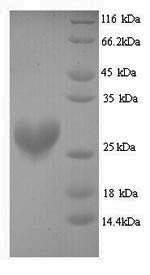The production of recombinant mouse Ribosyldihydronicotinamide dehydrogenase [quinone] (Nqo2) in yeast involves several steps. First, the gene encoding the full-length Nqo2 protein (1-231aa) is cloned into an expression vector with an N-terminal 6xHis-tag gene and transformed into yeast cells. These cells are cultured under conditions that promote protein expression. After reaching sufficient growth, the cells are lysed to release the recombinant Nqo2 protein. Purification of the harvested protein is done using affinity chromatography. Protein purity is assessed using SDS-PAGE, exceeding 90%.
Mouse NQO2 is an enzyme highly expressed in mouse oocytes during meiotic progression and is involved in protein transport, gene expression regulation, and meiotic maturation [1][2]. NQO2 is also detected in mouse hepatocytes and participates in the reduction of short-chain quinones and electron transfer within the mitochondrial respiratory chain [3].
Studies have indicated that NQO2 expression and activity can affect memory impairment in mouse models of Alzheimer's disease, with inhibitors of NQO2 showing the potential to improve cognition and reduce pathology in the brains of experimental mice [4]. Furthermore, NQO2 regulates reactive oxygen species' effects on mouse oocyte meiotic maturation and embryo development, highlighting its importance in reproductive processes [2].
References:
[1] E. Janda, F. Nepveu, B. Calamini, G. Ferry, & J. Boutin, Molecular pharmacology of nrh:quinone oxidoreductase 2: a detoxifying enzyme acting as an undercover toxifying enzyme, Molecular Pharmacology, vol. 98, no. 5, p. 620-633, 2020. https://doi.org/10.1124/molpharm.120.000105
[2] D. Chen, X. Li, X. Liu, X. Liu, X. Jiang, J. Duet al., Nqo2 inhibition relieves reactive oxygen species effects on mouse oocyte meiotic maturation and embryo development†, Biology of Reproduction, vol. 97, no. 4, p. 598-611, 2017. https://doi.org/10.1093/biolre/iox098
[3] R. Haefeli, M. Erb, A. Gemperli, D. Robay, I. Fruh, C. Anklinet al., Nqo1-dependent redox cycling of idebenone: effects on cellular redox potential and energy levels, Plos One, vol. 6, no. 3, p. e17963, 2011. https://doi.org/10.1371/journal.pone.0017963
[4] E. Janda, Polymorphisms and pharmacogenomics of nqo2: the past and the future, Genes, vol. 15, no. 1, p. 87, 2024. https://doi.org/10.3390/genes15010087




